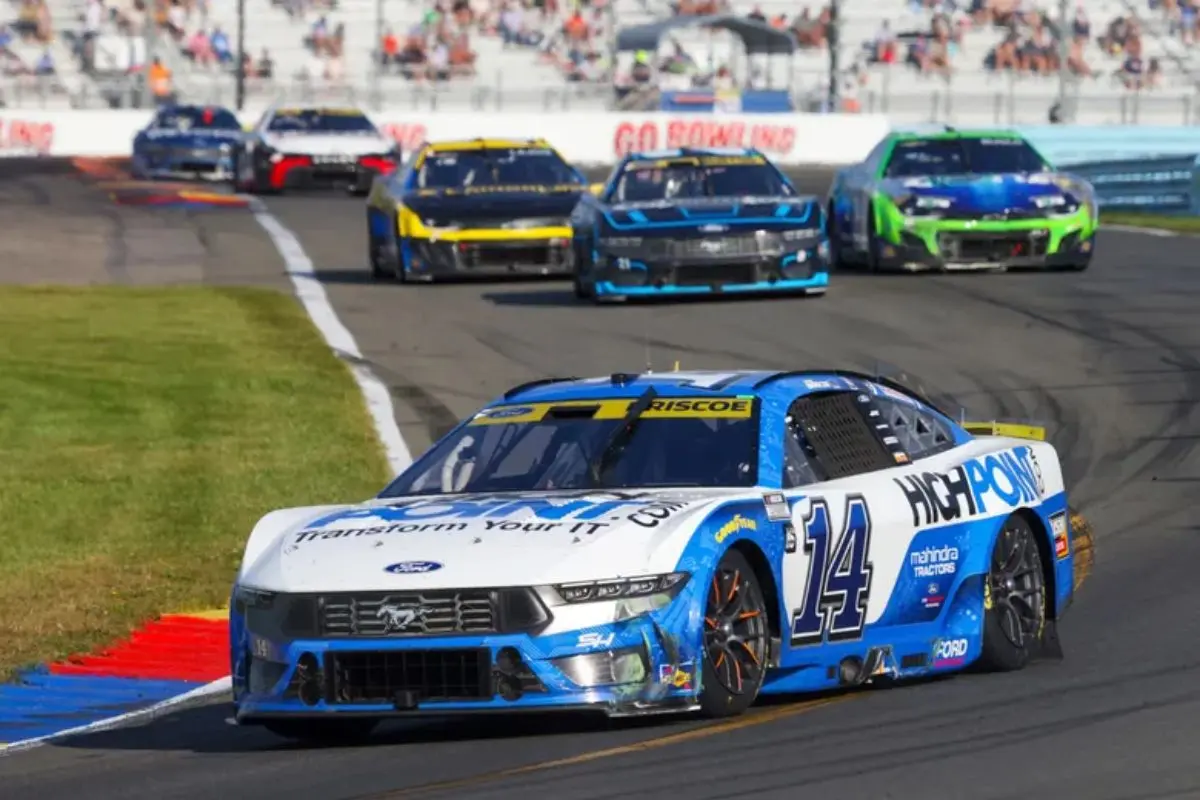Mike Borkowski’s NASCAR Career Ends: Mike Borkowski’s NASCAR career met a downfall when a legal impasse with AT&T arose from a failed sponsorship deal, exacerbating existing challenges on the track. As a pay driver during the dot-com boom, Borkowski struggled to match NASCAR’s demands, resulting in poor performances and on-track controversies. AT&T’s lawsuit against him, alleging breach of contract and damage to its brand, coincided with the economic strains of the dot-com burst, complicating financial commitments. The dispute highlighted the burden on athletes to fulfill corporate obligations. Despite this, Borkowski found redemption by successfully returning to road racing, displaying his adaptability and resilience.
Key Highlights
- AT&T filed a lawsuit against Borkowski for breach of contract and damaging their brand image.
- The lawsuit was linked to erratic driving and altercations during Borkowski’s NASCAR career.
- The sponsorship agreement with AT&T was personal, increasing Borkowski’s accountability.
- The lawsuit coincided with the dot-com bubble burst, prompting AT&T’s budget reevaluation.
- Borkowski’s NASCAR career ended amidst performance setbacks and corporate pressures.
Mike Borkowski’s Unconventional Path to NASCAR
How did Mike Borkowski‘s expedition to NASCAR defy convention? Unlike many of his contemporaries who ascended through the ranks of stock car racing, Borkowski’s background was firmly rooted in road racing, with noteworthy achievements in series such as Trans-Am and Indy Lights. His shift to NASCAR was not a mere career pivot, but rather an audacious entry into a sport traditionally dominated by seasoned stock car veterans.
Borkowski’s voyage was supported by his tactical pursuit of sponsorship, an essential element in motorsports. This unconventional path was emphasized by his partnership with AT&T, a telecommunications giant keen to extend its influence within NASCAR’s Busch Series during the lucrative dot-com boom era.
AT&T’s decision to support Borkowski marked a noteworthy departure from the norm, as sponsorship deals typically favored established NASCAR drivers with proven track records. Borkowski became one of the earliest instances of a pay driver in the stock car circuit, a role characterized by financial backing that facilitates entry into competitive racing.
This arrangement highlighted a shift in the sponsorship landscape, where the allure of brand visibility and marketing potential began to outweigh traditional metrics of racing success.

Disastrous Racing Results and On-Track Controversies
While Mike Borkowski‘s entry into NASCAR represented a bold challenge to traditional pathways, his performance on the track told a markedly different story. The course of his career was tainted with uninspiring results and controversies that overshadowed any potential. His initial five races were a demonstration of this struggle:
- Daytona Disappointment: Finishing 22nd at the iconic Daytona 500 hinted at potential, but was quickly followed by lackluster performances.
- Subsequent Struggles: Three consecutive finishes outside the top 40 laid bare the challenges Borkowski faced in adapting to NASCAR’s demands.
- Darlington Devastation: An accident at Darlington further compounded a streak of unfortunate results.
A fleeting moment of success came at Talladega, where Borkowski achieved a top-10 finish. However, this was largely attributed to the unpredictable nature of restrictor-plate racing rather than a demonstration of skill or consistency.
The subsequent decision by Bill Davis Racing to field seasoned driver Dave Blaney highlighted the potential of the car and emphasized Borkowski’s shortcomings.
Returning to the track at New Hampshire, Borkowski’s reputation suffered a considerable blow amidst tragedy, as he was involved in four separate accidents. His intentional collisions with Jason Jarrett and Lyndon Amick drew widespread condemnation, particularly during a weekend already darkened by the death of Adam Petty.
Despite securing a 21st place finish, his best non-restrictor-plate result, the damage to his reputation was profound and lasting. The incidents highlighted an inability to navigate the demands and complexities of NASCAR, sealing his fate in racing.
AT&T’s Lawsuit Against Mike Borkowski
Despite the thrill of high-speed racing, Mike Borkowski’s off-track challenges culminated in a considerable legal dispute with AT&T. The telecommunications giant pursued legal action following a sponsorship deal that went awry, filing a federal lawsuit against Borkowski and his marketing company, ESBG Marketing.
At the centre of the dispute was an alleged breach of contract, with AT&T asserting that Borkowski’s conduct had profoundly damaged their brand’s image.
The sponsorship agreement was remarkably personal, directly involving Borkowski rather than the racing team, Bill Davis Racing. This individual arrangement placed a heightened responsibility on Borkowski to uphold AT&T’s corporate image.
Unfortunately, his erratic driving and involvement in televised altercations were perceived as a direct contravention of this responsibility. AT&T argued that such behavior betrayed the trust they had placed in him, diminishing the brand’s association with professionalism and integrity.
From AT&T’s perspective, Borkowski’s on-track actions were the proverbial final straw. The lawsuit highlighted the extent to which Borkowski’s performance and conduct were viewed as detrimental to a brand that values its reputation highly.

Timing of the Lawsuit and Sponsorship Fallout
The timing of the lawsuit against Mike Borkowski could not have been more precarious, coinciding with the aftermath of the dot-com bubble burst in mid-2000, which forced many corporations, including AT&T, to reevaluate their financial commitments.
This economic downturn led to severe budget cuts across numerous sectors, including sports sponsorships. AT&T’s $600,000 sponsorship of Mike Borkowski’s NASCAR campaign was under scrutiny as companies scrambled to mitigate losses.
The fallout from the lawsuit was immediate and substantial. Borkowski’s exit from NASCAR marked the end of his career in the racing series.
AT&T’s decision to continue its association with Bill Davis Racing highlighted their tactical shift to more dependable drivers. The replacement of Mike Borkowski with seasoned drivers such as Dave Blaney and Scott Wimmer exemplified this approach. Under their stewardship, the team achieved notable results, providing AT&T with a semblance of return on investment.
The burst of the dot-com bubble forced corporations like AT&T to reassess the value and effectiveness of their sponsorship deals, leading to a shift towards more reliable investments.
Mike Borkowski’s Return to Road Racing
After the tumultuous end to his NASCAR career, Mike Borkowski returned to the discipline where his talents truly shone: road racing. Embracing the familiar dynamics of sports cars, he swiftly reestablished himself as a formidable competitor.
His return to road racing was marked by notable achievements, including three overall victories in the highly competitive Daytona Prototypes series. These successes highlighted his adeptness behind the wheel, a sharp contrast to his turbulent NASCAR stint.
Mike Borkowski’s skill on the track was further exemplified in 2004 when he clinched an LMP2 class victory at the esteemed 12 Hours of Sebring. This victory was a confirmation not only to his skill but also to his resilience, proving that his earlier NASCAR missteps did not define his capabilities as a racer.
The shift back to road racing allowed Mike Borkowski to operate in an environment that played to his strengths, away from the demands and pitfalls that had plagued his stock car racing experience.

News in Brief: Mike Borkowski’s NASCAR Career Ends
Mike Borkowski’s NASCAR career faced a tumultuous end, marked by poor racing performances and several on-track disputes. The situation worsened when AT&T filed a lawsuit regarding an unsuccessful sponsorship agreement, leading to considerable financial and reputational repercussions.
The timing of the legal action coincided with the collapse of the sponsorship, further complicating Mike Borkowski’s racing endeavors. Consequently, Mike Borkowski shifted back to road racing, seeking to rebuild his professional life following the setbacks experienced in NASCAR.
ALSO READ: Insider Calls NASCAR’s New Rule Unnecessary as Helio Castroneves Gets Daytona 500 Spot
